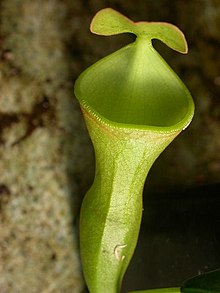风铃猪笼草
| 风铃猪笼草 | |
|---|---|
 | |
| 人工种植的风铃猪笼草 | |
保护状况 | |
 易危(IUCN 3.1)[1] | |
科学分类 | |
| 界: | 植物界 Plantae |
| 演化支: | 被子植物 Angiosperms |
| 演化支: | 真双子叶植物 Eudicots |
| 目: | 石竹目 Caryophyllales |
| 科: | 猪笼草科 Nepenthaceae |
| 属: | 猪笼草属 Nepenthes |
种: | 风铃猪笼草 N. campanulata |
二名法 | |
Nepenthes campanulata Sh.Kurata (1973)[2] | |
风铃猪笼草(学名:Nepenthes campanulata)是印度尼西亚婆罗洲特有的热带食虫植物。[3]其种加词“campanulata”来源于拉丁文“campānulātus”,意为“钟形的”。
1983年的一场森林大火,烧毁了风铃猪笼草原唯一已知的原生地。当时不能确定其是否已灭绝或还存在于其他地区。[4]直至1997年,在其模式产地数百公里以外重新发现了风铃猪笼草的分布地。风铃猪笼草已被列入《2006年世界自然保护联盟濒危物种红色名录》中,保护状况暂为数据缺乏。[1]
尚未发现风铃猪笼草的自然杂交种。[5]也未有关于风铃猪笼草种下类群的描述。[4]
目录
1 植物学史
2 形态特征
3 生态关系
4 相关物种
5 注释
6 参考文献
7 扩展阅读
植物学史
1957年9月9日,茂物林业研究所植物部负责人A·J·G·科斯特曼首次在岩花山采集到了风铃猪笼草[6][注 1]。此外,在这次考察中还采集到了马普鲁山猪笼草(N. mapuluensis)的模式标本。A·J·G·科斯特曼对于这个发现写道:[注 2][8]
| “ | 我当时在桑库利朗的林业部工作,我刚刚完成了对岩花[注 3]上游地区研究。经过了10天的寻找,我们第一次见到了那个黄色的岩壁。走进才发现其呈现为黄色是因该高约50米的岩壁上附满了猪笼草的叶片。我们砍了一棵树做为梯子爬上去。这些猪笼草没有开花也没有结实…… | ” |
1973年,仓田重夫基于存放在新加坡植物园标本馆中编号为“Kostermans 13764”的风铃猪笼草标本,将其描述为一个独立的物种。[2]编号为“spec. nov.!”的等模标本存放于位于巴黎的法国国家自然历史博物馆中。另两份等模标本存放于纽约植物园中。[6][9]仓田重夫指出,风铃猪笼草仅存在于单一地区“大概是由于其要求原生地必须为海拔约300米的砂质或石灰岩质岩壁”。[2][8]
风铃猪笼草最初的模式标本无花序,直至1997年重新发现后才得到补充。
@media all and (max-width:720px){.mw-parser-output .tmulti>.thumbinner{width:100%!important;max-width:none!important}.mw-parser-output .tmulti .tsingle{float:none!important;max-width:none!important;width:100%!important;text-align:center}}


形态特征
风铃猪笼草的攀援茎短小,呈圆柱形,长20至50厘米[2],直径可达4毫米。茎至一定长度后便停止生长,转而由基部生出侧芽继续生长。[3]
风铃猪笼草的叶片革质,无柄,呈匙形-披针形,可长达12厘米[10],宽至2厘米。叶尖圆并略呈盾形,叶基抱茎。中脉的两侧各有2至3条纵脉,羽状脉不明显。笼蔓短而硬,长度很少超过4厘米。[4]
与其他的猪笼草不同,风铃猪笼草的捕虫笼只有一种形态。其形状为钟形,黄绿色,可高达10厘米[10],直径约为5.5厘米。捕虫笼通常无笼翼,其缩小为一对隆起。仅捕虫笼内表面下部的四分之一覆盖着消化腺。笼口呈圆形且水平。唇非常的窄,具细小的唇齿。笼盖呈椭圆形,无附属物。笼盖基部后方的笼蔓尾分叉,可长达1毫米。风铃猪笼草完全无被毛。[4]
风铃猪笼草沿地面匍匐生长。成年植株通常具多个生长点,形成丛状。[11]
生态关系
1983年的一场森林大火,烧毁了风铃猪笼草的模式产地。[11]所有当时已知的野外分布在1991年底至1992年初全部消失。[12]当时普遍认为风铃猪笼草已经灭绝了。直至1997年,李乾重新在沙捞越姆鲁山国家公园内的石灰岩壁上发现了风铃猪笼草,其距离模式产地约400公里。[3][1][13][14][15][16]
风铃猪笼草为低地猪笼草,其生长于海拔300米至500米处。[10]其原生地为潮湿且长满苔藓岩壁,并且其似乎仅存在于石灰岩质的岩壁上。[10]
相关物种
在仓田重夫对风铃猪笼草的描述中,他认为风铃猪笼草可能与苏门答腊特有的无刺猪笼草(N. inermis)之间存在着密切的近缘关系。[2]但其他的分类学家并不认同这个观点。[12]这两个物种之间不仅存在地理隔离,并且它们的生境也不同;风铃猪笼草为石灰岩岩壁上,而无刺猪笼草通常附生于海拔1500米至2600米的树林中。[4][17]
注释
^ 1957年9月8日至9月19日,A·J·G·科斯特曼对岩花山考察为婆罗洲东部考察的一部分。[7]
^ A·J·G·科斯特曼描述首次发现风铃猪笼草的原文:[8]
“
I was working for the Forestry Department at that time in Sangkulirang and when I had finished I wanted to find out about a flowering rock, Ilas Bungaan, upriver. After 10 days walking I saw the yellowish rock for the first time. When we were there we discovered that the yellow colour was that of the leaves of a Nepenthes completely covering the steep face of the 50 m high rock. We cut a tree that fell to the rock and acted as a ladder and climbed up. The Nepenthes was not in flower or fruit, but we found caves in the rock and in the caves a couple of boat-like coffins with sculptured dog-head ends which contained decapitated skeletons.
”
^ 印尼文意为“开花的岩石”;“ilas”意为“岩石”,“bungaan”意为“开花的”。[8]
参考文献
^ 1.01.11.2 Nepenthes campanulata. IUCN Red List of Threatened Species 2006. International Union for Conservation of Nature. 2006.
^ 2.02.12.22.32.4 Kurata, S. 1973. Nepenthes from Borneo, Singapore and Sumatra. The Gardens' Bulletin Singapore 26(2): 227–232.
^ 3.03.13.2 夏洛特. 食蟲植物觀賞&栽培圖鑑. 台北: 商周出版. 2007: 54. ISBN 978-986-124-850-9.
^ 4.04.14.24.34.4 Clarke, C.M. 1997. Nepenthes of Borneo. Natural History Publications (Borneo), Kota Kinabalu.
^ McPherson, S.R. 2009. Pitcher Plants of the Old World. 2 volumes. Redfern Natural History Productions, Poole.
^ 6.06.1 Specimen Details: Nepenthes campanulata Kurata (NY Specimen ID: 39331). The New York Botanical Garden.
^ van Steenis-Kruseman, M.J., et al. 2006. Cyclopaedia of Malesian Collectors: André Joseph Guillaume Henri Kostermans. Nationaal Herbarium Nederland.
^ 8.08.18.28.3 Phillipps, A. & A. Lamb 1996. Pitcher-Plants of Borneo. Natural History Publications (Borneo), Kota Kinabalu.
^ Specimen Details: Nepenthes campanulata Kurata (NY Specimen ID: 39332). The New York Botanical Garden.
^ 10.010.110.210.3 Lee, C.C. 2006. Species profile: Nepenthes campanulata. WildBorneo.
^ 11.011.1 Clarke, C.M. & C.C. Lee 2004. Pitcher Plants of Sarawak. Natural History Publications (Borneo), Kota Kinabalu.
^ 12.012.1 Nerz, J. 1994. Nepenthes-discussion. Carnivorous Plant Mailing List.
^ Steiner, H. 2002. Borneo: Its Mountains and Lowlands with their Pitcher Plants. Toihaan Publishing Company, Kota Kinabalu.
^ Hansen, E. 2001. Where rocks sing, ants swim, and plants eat animals: finding members of the Nepenthes carnivorous plant family in Borneo. Discover 22(10): 60–68.
^ Lee, C.C. 2004. New records and a new species of Nepenthes (Nepenthaceae) from Sarawak. Sandakania 15: 93–101.
^ (日文) Kurata, S. 2000. 再発見のネペンテス・カンパヌラータ S.Kurata. Journal of Insectivorous Plant Society 51(3).
^ Clarke, C.M. 2001. Nepenthes of Sumatra and Peninsular Malaysia. Natural History Publications (Borneo), Kota Kinabalu.
.mw-parser-output .refbegin{font-size:90%;margin-bottom:0.5em}.mw-parser-output .refbegin-hanging-indents>ul{list-style-type:none;margin-left:0}.mw-parser-output .refbegin-hanging-indents>ul>li,.mw-parser-output .refbegin-hanging-indents>dl>dd{margin-left:0;padding-left:3.2em;text-indent:-3.2em;list-style:none}.mw-parser-output .refbegin-100{font-size:100%}
- Adam, J.H., C.C. Wilcock & M.D. Swaine 1992. The ecology and distribution of Bornean Nepenthes.PDF Journal of Tropical Forest Science 5(1): 13–25.
Bourke, G. The Nepenthes of Mulu National Park. Carniflora Australis. 2011, 8 (1): 20–31.
(印尼文) Handayani, T. 1999. Konservasi Nepenthes di kebun raya Indonesia.PDF [Conservation of Nepenthes in Indonesian botanic gardens.] In: A. Mardiastuti, I. Sudirman, K.G. Wiryawan, L.I. Sudirman, M.P. Tampubolon, R. Megia & Y. Lestari (eds.) Prosiding II: Seminar Hasil-Hasil Penelitian Bidang Ilmu Hayat. Pusat Antar Universitas Ilmu Hayat IPB, Bogor. pp. 365–372.- Lee, C.C. 2000. Recent Nepenthes Discoveries. [video] The 3rd Conference of the International Carnivorous Plant Society, San Francisco, USA.
- McPherson, S.R. & A. Robinson 2012. Field Guide to the Pitcher Plants of Borneo. Redfern Natural History Productions, Poole.
扩展阅读
- 食虫植物照片搜寻引擎中风铃猪笼草的照片
![]() 維基共享資源中有關风铃猪笼草的多媒體資源
維基共享資源中有關风铃猪笼草的多媒體資源
![]() 維基物種中有關风铃猪笼草的數據
維基物種中有關风铃猪笼草的數據
| ||||||||||||||||||||||||||||||||||||||||||||||||||||||

Comments
Post a Comment